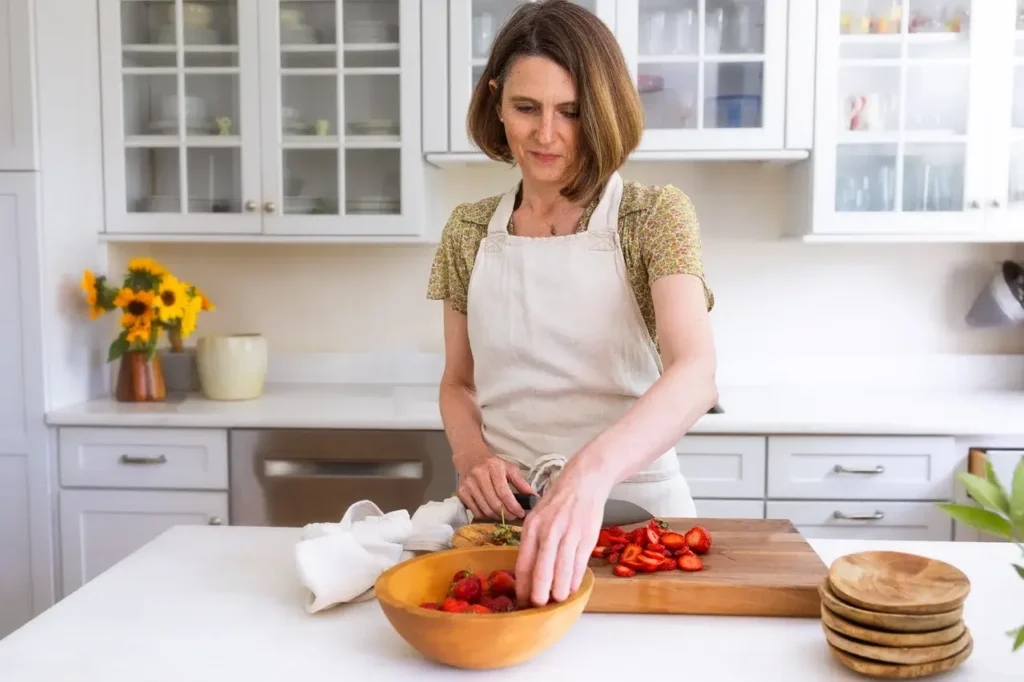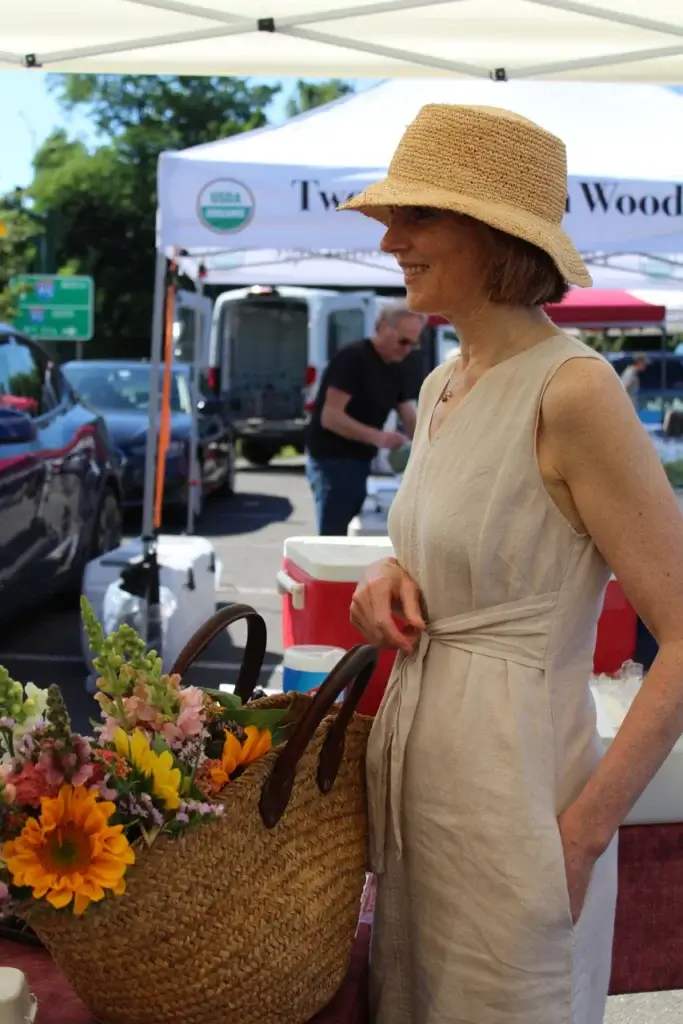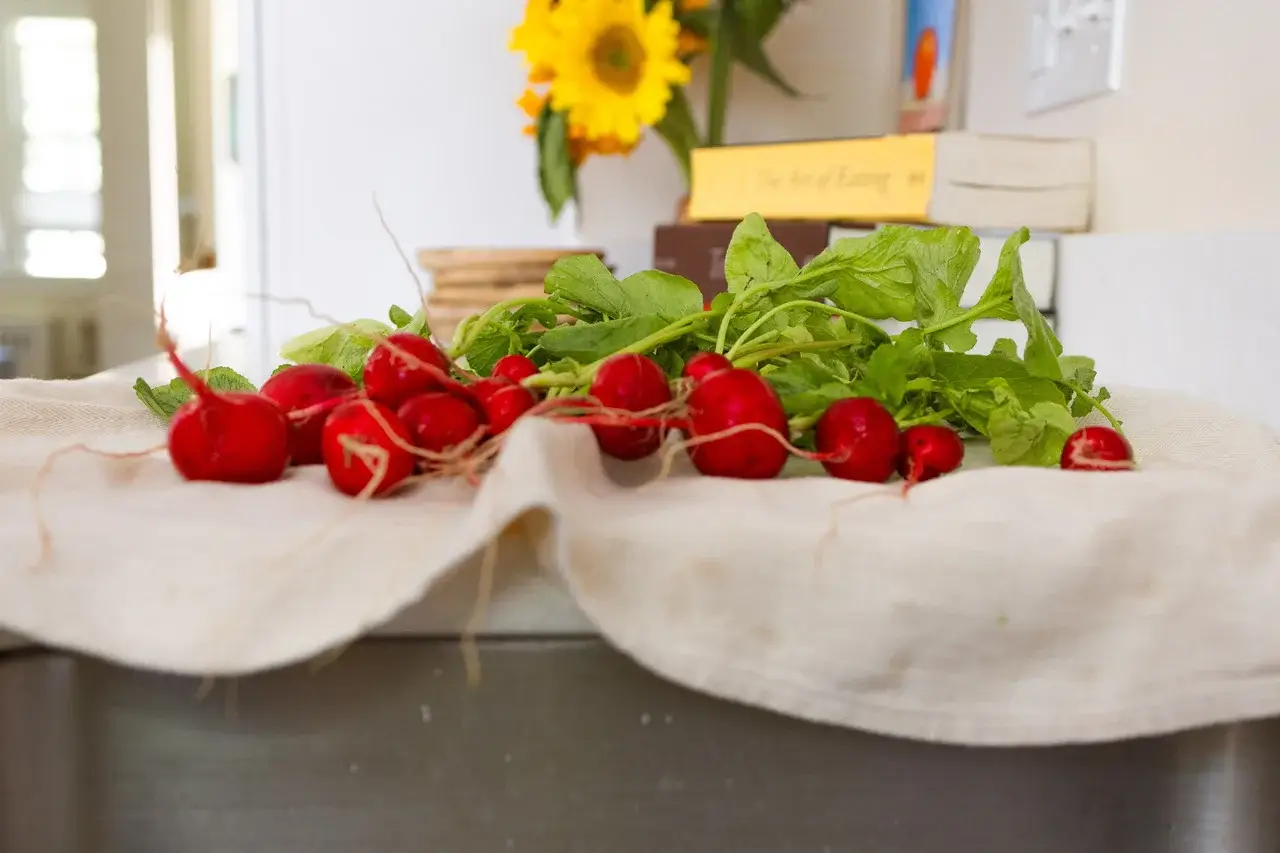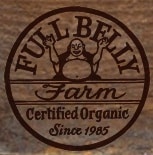
Ali prepping Riverbank Farm strawberries by Maggie Menendez 1 jpg.webp.webp
Ali Ghiorse wants to transform our food system. A formidable goal, to be sure, but the former Bay Area chef is inspired by the years she spent immersed in Northern California’s food culture, where locally and sustainably produced food and drink is standard.
Ghiorse had stopped cooking professionally by the time she had moved back to her hometown of Greenwich in 2014; years of cooking at scale had been physically demanding and stressful, and she was ready to expand her knowledge and skills. But she felt she had lost her platform to connect with the food system in an impactful way.

She began learning about the area’s food system and volunteering with local endeavors like the town’s sustainability committee. The committee helps guide Greenwich in advancing sustainable policies and practices that impact its natural environment, economy, and community. As chair of the committee’s food systems sector, she noticed “a gap,” she says, “in general awareness of the deeply ingrained, harmful impacts of our industrial food system.”
TAKE ACTION
Does your town have a sustainbility committee? Check this map of local and regional government committees.
So, in 2020, she founded The Foodshed Network (TFN), an educational and convening platform to encourage residents in her hometown of Greenwich, CT, and surrounding Fairfield County to become food system changemakers.
“Our food system is so complicated,” says Ghiorse. “It’s very important to know and understand the impacts of our industrial system and then to understand the huge amounts of creativity, connectivity, and community that happens around food.”

Living in the activist hotbed of San Francisco’s Mission District helped her realize the connection between systemic racism and food access. “It’s fraught with deeply rooted practices of exploitation,” says Ghiorse, “beginning with the enslavement of Africans, the genocide of Indigenous peoples, and extraction of soil watersheds, and natural and social ecosystems.
“I learned about the importance of bridge building, network weaving, cross pollinating between initiatives, and convening people around food, and,” she emphasizes, “using the power of gathering as a lever for social change and healing.”
LEARN MORE
Find out how to be a food policy advocate in your community.
To address all of these distinct yet intersecting issues, TFN is made up of several sub-organizations, including the Greenwich Food Alliance (GFA), The Foodshed Forum, and a resource library. The GFA is a community of practice, assembling business leaders and government officials in an informal group bound by shared interests and expertise. Members network, share ideas, and learn about issues and advocate for policy surrounding food, such as making SNAP benefits available at nearby farmers markets. The Foodshed Forum is the educational arm, partnering with organizations to host events such as a current three-part lecture series entitled “Heritage Foodways: Seed, Hearth & Taste” at local libraries.
The resource library, available on the website, offers a wealth of information including Thirty Ways to be a Food System Changemaker, concrete suggestions people can take to be changemakers. There’s also a monthly newsletter.

Ghiorse runs TFN full-time; it’s self-funded on a shoestring budget, but she is working towards non-profit status and finding a fiscal sponsor so she can begin fundraising.
Myra Klockenbrick, land and water Sector chair of the Greenwich Sustainability Committee and co-director of Greenwich Pollinator Pathway, credits Ghiorse with bringing up a conversation that is not natural to Greenwich. Although Greenwich is particularly affluent, the town has initiatives such as community gardens and a food pantry, as 29 percent of the community experiences financial hardship.
“She’s really deepened our awareness of the diversity in our population,” says Klockenbrick. “She has this knack and grace of not being on her high horse, but educating us deeply about our food system, both good and bad in ways that aren’t scolding but always uplifting.”
“Ali’s brought this food system conversation to Greenwich,” says Sarah Coccaro, the Town of Greenwich’s assistant director of environmental affairs. “There was conversation around food systems,” she adds, “but there wasn’t any framing or awareness of the food system with a sort of equitable racial justice lens on it.”
TAKE ACTION
Would you like to “Grow a Row” for your community? Find out how to start your own campaign here.
Coccaro says food systems topics are being integrated into conversations within the town’s Conservation committee, and that she sees the context that TFN offers helping residents understand the industrial food system’s impact. She mentions a new Grow A Row effort in which community members grow an extra row of food in their gardens to donate. “People are starting to connect dots around food systems and how it needs to change and what they can do on a local level or regional level,” she says, “and I’m proud to see that change happening.”

Ghiorse aspires to create a culture shift where food, land, and seed sovereignty are the norm. That’s “the North Star for me, where people and community reclaim our collective commons,” she sas. “That’s fertile soil, clean waterways, and nutrient-rich woodlands that are accessible and available to everyone as a human right. That’s foundational.”
Source link
2024-08-29 07:30:38
Karl Hoffman is a distinguished agriculturalist with over four decades of experience in sustainable farming practices. He holds a Ph.D. in Agronomy from Cornell University and has made significant contributions as a professor at Iowa State University. Hoffman’s groundbreaking research on integrated pest management and soil health has revolutionized modern agriculture. As a respected farm journalist, his column “Field Notes with Karl Hoffman” and his blog “The Modern Farmer” provide insightful, practical advice to a global audience. Hoffman’s work with the USDA and the United Nations FAO has enhanced food security worldwide. His awards include the USDA’s Distinguished Service Award and the World Food Prize, reflecting his profound impact on agriculture and sustainability.



Elon Musk: Changing the game, one self-driving car at a time.
Farm Radio satire: Horses compete in a talent show, trot their best moves.